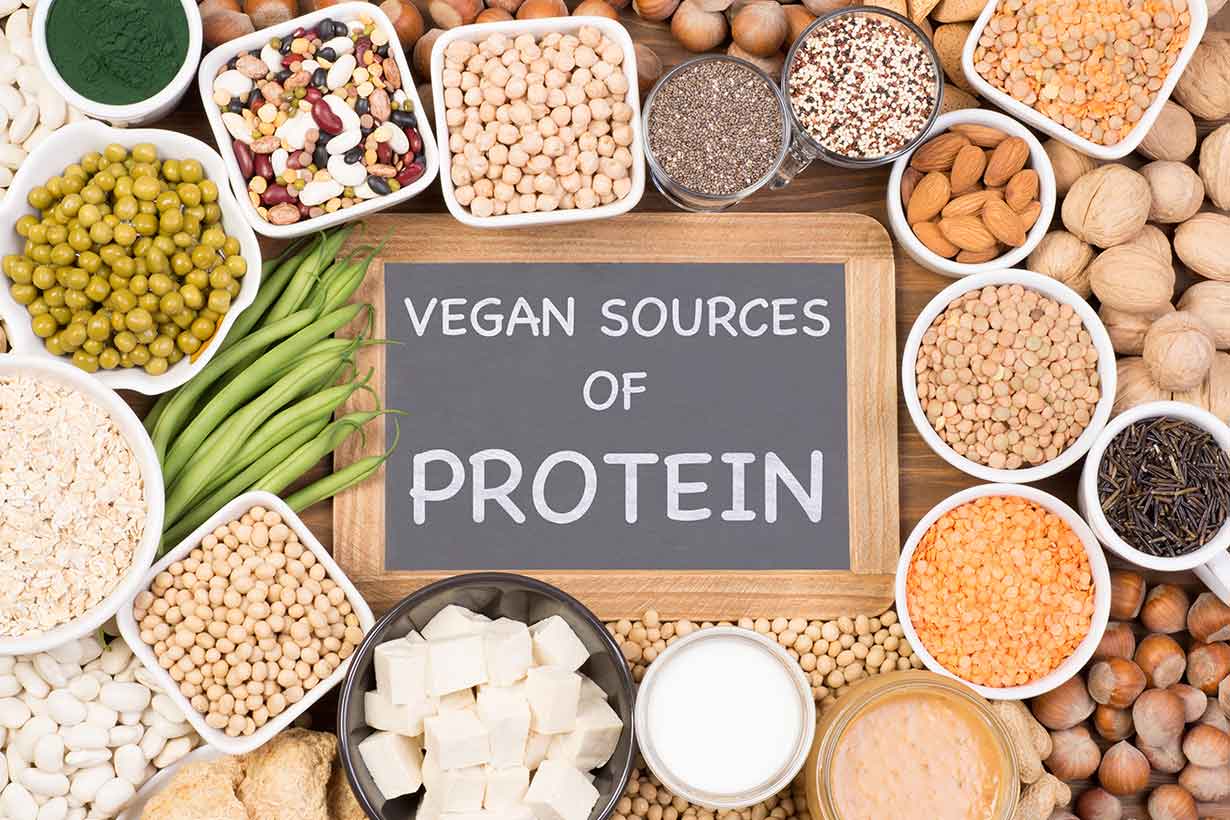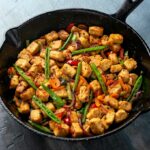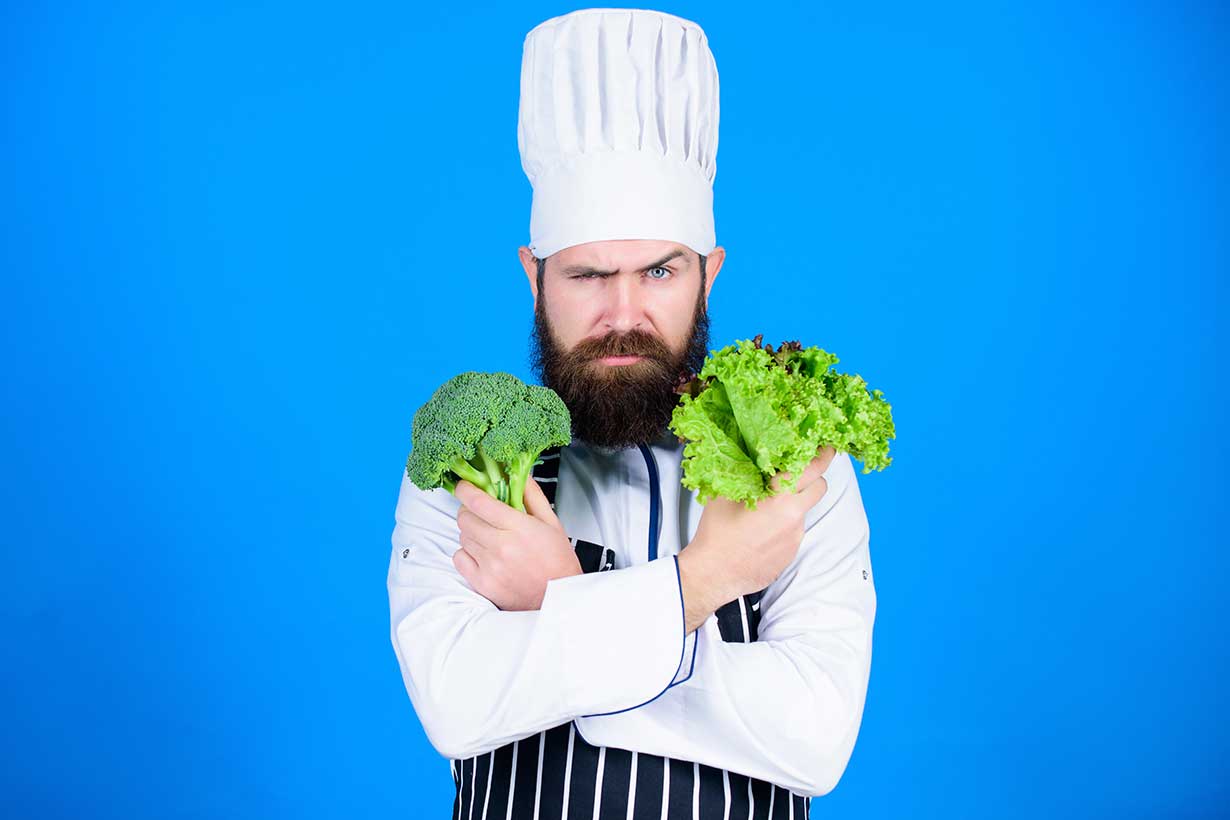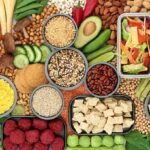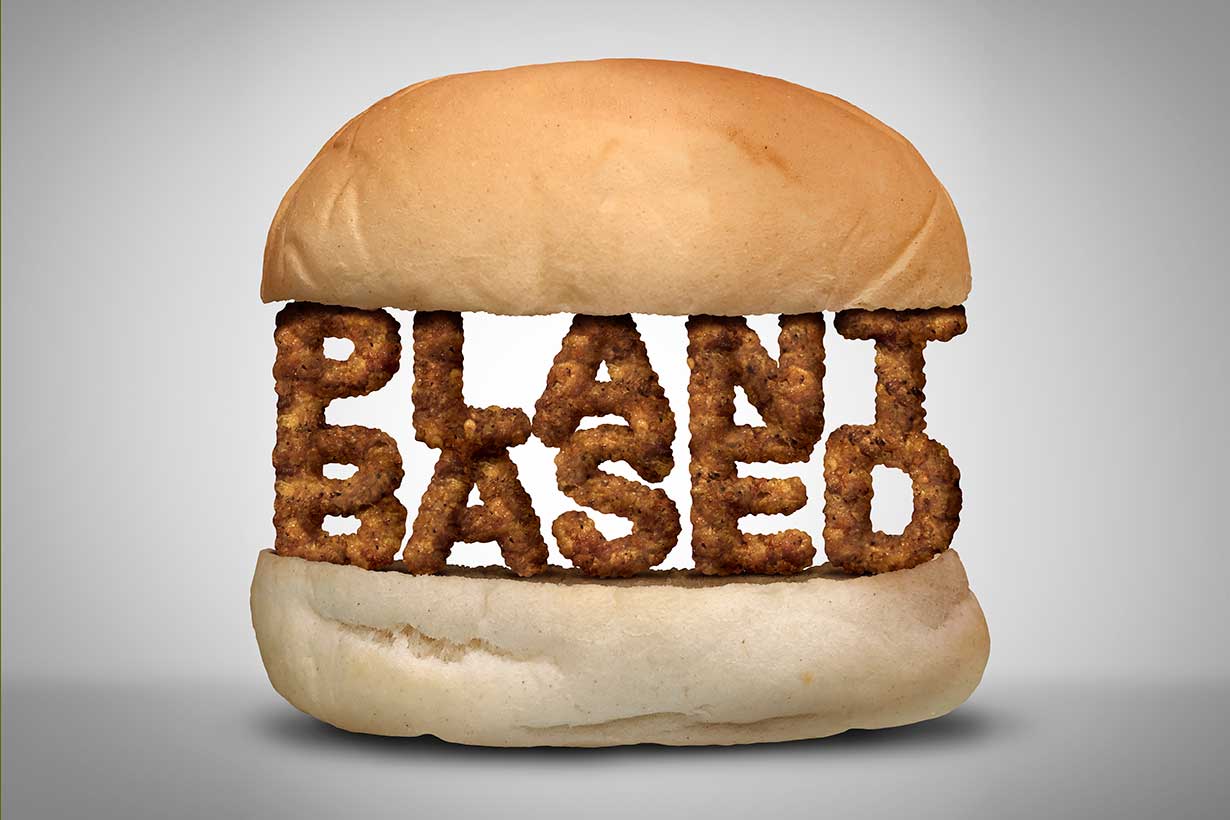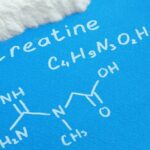There are many different diets that people follow.
Over recent months and years, interest in plant-based and vegan diets has increased.
Various factors have driven this interest, including animal welfare and environmental concerns and commercial interest from large food manufacturers.
However, is there also a nutritional argument for adopting a vegan diet?
This article provides a guide to vegan diets and takes an objective look at their potential benefits and downsides.
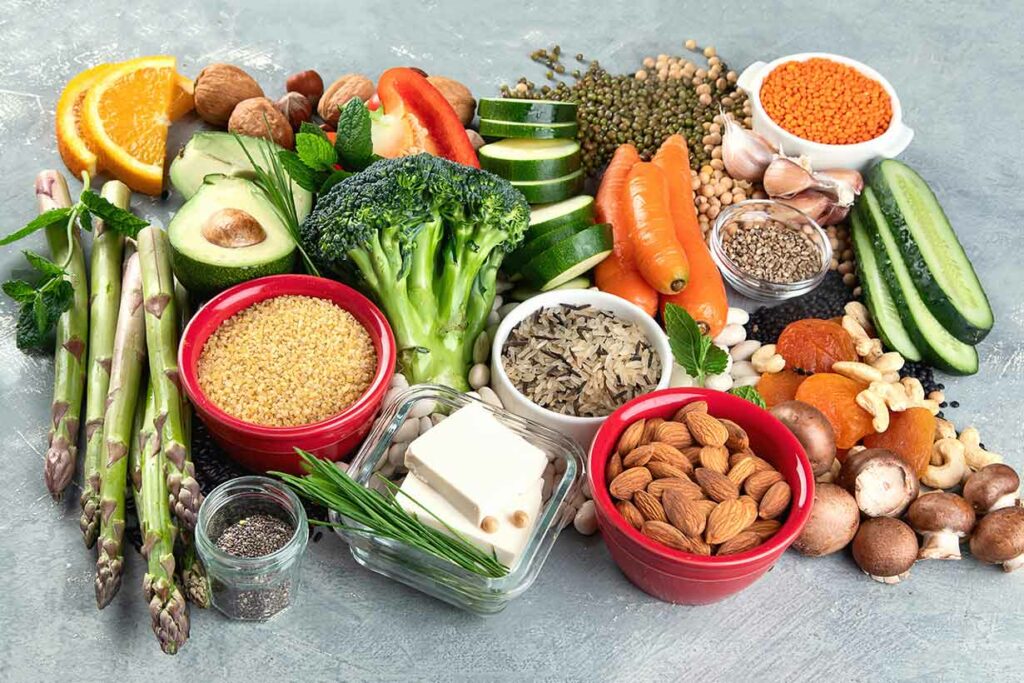
Table of contents
What Is a Vegan Diet?
Firstly, it is important to define a ‘vegan diet’ and how it differs from a ‘plant-based diet.’
Put simply; a vegan diet excludes all animal foods.
This does not just mean meat, but also dairy, eggs, seafood, and any food products that contain animal-derived ingredients.
While ‘plant-based’ diets are similar to vegan diets, they do not necessarily exclude animal foods. For example, a diet of 85% plants and 15% animal foods could reasonably be called ‘plant-based.’
Popular diets such as the Mediterranean diet and the Nordic diet are good examples of plant-predominant diets that also feature animal foods.
Dietetic associations, including the Academy of Nutrition and Dietetics and the British Dietetic Association, use the accepted term ‘vegan diet’ for animal-free diets (1, 2).
There is often some confusion about this, as many people who follow a vegan lifestyle refer to their diet as ‘plant-based.’
A note on ethical and environmental issues surrounding vegan diets
Many people choose a vegan diet due to ethical concerns about animal welfare, and some individuals do so for perceived environmental benefits.
While these are important topics to debate, this is solely a nutrition article and will not attempt to comment on such issues.
These issues are best left for those with greater knowledge in these areas to discuss.
Do Vegan Diets Have Benefits?
Like all diets, there are no guaranteed benefits simply from following a vegan diet per se.
The reason: it very much depends on food choices and the overall nutritional adequacy of the dietary pattern.
For instance, here is a simple example to demonstrate the point:
| Meal Plan 1 (not good) | Meal Plan 2 (good) |
|---|---|
| Breakfast: Pop-Tarts, a glass of orange juice | Breakfast: rolled oats, berries, soy milk |
| Snacks: Potato chips, cookies, and a caramel macchiato | Snacks: a handful of mixed nuts, fruit |
| Lunch: Vegan cheese taco, can of Cola | Lunch: Tofu and vegetable poke bowl |
| Dinner: Vegan burger, fries | Dinner: Barley, lentil, and vegetable stew |
| Supplements: none | Supplements: pea protein, vitamin B12, iodine, EPA/DHA, vitamin D |
As we can see, both of these meal plans are vegan-friendly, but only one of them provides a balanced intake of nutrient-rich foods.
In other words: following a well-formulated vegan diet that is nutritionally adequate may have benefits.
However, simply following a plant-exclusive diet doesn’t guarantee that this way of eating will be health-promoting.
What Potential Benefits Might Vegan Diets Have?
A vegan diet based around whole plant foods, such as fruit, vegetables, legumes, whole grains, nuts, and seeds, should offer several benefits.
Here are some of these potential benefits.
Whole Plant Food Vegan Diets Are Rich In Dietary Fiber
Most people fall short of the recommended level of fiber intake. For example, only about 5% of the American population meets current fiber recommendations (3, 4, 5).
On this note, the current recommended daily value for fiber is 28 grams per day based on a 2000-calorie diet (6). However, the mean fiber intake in the United States is only 17 grams per day (3).
Since whole plant foods are rich in fiber, a diet focused on these foods should allow more people to meet the recommended intake levels. Legumes and genuine whole grains (such as whole wheat, barley, and oats) contain high amounts of fiber.
Additionally, foods such as leafy green vegetables offer a large amount of fiber for very few calories.
Multiple large cohort studies (observational studies) consistently find that higher dietary fiber intake is associated with lower cardiovascular and all-cause mortality. Moreover, these findings are statistically significant and with a high degree of confidence (7, 8, 9).
Vegan Diets May Lower the Risk Profile of Cardiovascular Disease
Some studies have suggested that a vegan dietary pattern may potentially lower the risk of cardiovascular disease (10, 11, 12, 13).
However, in a recent comprehensive systematic review of vegan diets and cardiovascular health, the diet was not associated with cardiovascular outcomes (14).
Despite these mixed results from scientific research, the quality of the specific vegan diet is probably the critical determinant of reduced risk. In other words, cardiovascular benefits would likely apply to well-formulated vegan diets featuring lots of whole plant foods.
In contrast, it is possible to consume a nutritionally poor vegan diet. For instance, many vegan-friendly processed foods contain large amounts of refined carbohydrates and saturated fat from palm oil.
In this regard, simply choosing vegan packaged foods (rather than whole foods) could result in a high intake of saturated fat, refined carbs, and sugar.
With that said, let’s now look at some reasons how well-formulated vegan diets may potentially lower cardiovascular risk.
People consuming vegan diets have lower levels of LDL cholesterol
One of the main mechanisms through which vegan diets may lower cardiovascular risk is by improving the lipid (cholesterol) profile.
For example, studies have demonstrated that people who consume a vegan diet tend to have lower levels of LDL cholesterol (15, 16).
Cardiovascular disease has multiple potential causes. However, high levels of LDL-cholesterol (LDL-C) and specifically apolipoprotein B particles play a crucial role in its initiation (17, 18, 19).
Higher intakes of particular saturated fatty acids tend to increase LDL levels reliably, so when consumed above a certain threshold, this can raise the risk of cardiovascular disease (20, 21).
Animal foods are not consumed as part of a vegan diet, and high-fat animal foods are rich in saturated fat.
Additionally, most foods that tend to lower LDL-C levels are plant-based, such as whole grains, nuts, seeds, and unsaturated oils.
Thus, vegans tend to have lower levels of LDL-C.
Vegan diets may lower blood pressure
High blood pressure is one of the significant risk factors for developing cardiovascular disease (22).
A recent systematic review and meta-analysis of randomized controlled trials found that vegan diets can lower blood pressure. Eleven clinical trials were included in the analysis, featuring a total of 983 participants (23).
The results of the study demonstrated that:
- Vegan diets reduced mean systolic blood pressure (SBP) by 1.33 mm Hg and diastolic blood pressure (DBP) by 1.21 mm Hg. However, these changes were not statistically significant, which means we can’t be confident the vegan diet caused them.
- In participants with high baseline systolic blood pressure (>130 mm Hg), a vegan diet significantly reduced SBP by 4.10 mm Hg and DPB by 4.01 mm Hg. These results were statistically significant.
Interestingly, the vegan diet was roughly equal in effect size to portion-controlled diets and medically advised diets. However, the vegan diets in the meta-analysis were not calorie-restricted like most medical diets.
There are many potential ways in which a well-formulated vegan diet may lower blood pressure, such as the probable inclusion of numerous potassium-rich foods.
Potassium is an essential mineral that plays a key role in blood pressure regulation. However, a large proportion of the population does not obtain sufficient potassium from their diet (24, 25).
Other Potential Benefits
Once again, no diet has a magical effect, and the potential benefits of a vegan diet very much depend on the specific foods consumed.
However, for a diet rich in whole plant foods, the diet should provide large amounts of polyphenols, which are associated with various potential health benefits (26).
Plant-based diets, rich in plant foods, have consistently led to weight loss in large cohort studies and randomized controlled trials (27, 28, 29).
That said, any reasonably well-formulated diet can result in weight loss.
For example, in clinical trials, omnivorous ketogenic diets have also been effective for weight loss.
The main thing to remember here is that many different diets can be effective, but that all depends on if the individual can sustain them.
For this purpose, a nutritionally adequate diet that meets the needs of the individual (financially, culturally, and for enjoyment) is essential.
Are There Any Nutritional Downsides of Vegan Diets?
The biggest nutritional downside of a vegan diet is that it can be harder to obtain certain nutrients.
It Can Be Harder To Ensure Sufficient Intake of Key Vitamins and Minerals
Due to its very nature, a vegan diet restricts all sources of animal-based foods.
As a result, this restriction of foods can make it more difficult to obtain several vitamins and minerals in sufficient quantities.
These nutrients include:
- Calcium
- Iodine
- Iron
- Vitamin B12
- Vitamin D
- Zinc
It is essential to research and be aware of good dietary sources for each nutrient to ensure a sufficient intake.
Calcium
An anti-nutritional factor (or antinutrient) called oxalic acid (or oxalate) found within some plant foods can lower the absorption of calcium (30, 31).
As a result, vegans need to obtain enough calcium from foods with low amounts of oxalic acid.
The table below displays some calcium-rich foods that are vegan-friendly and very low in oxalate. Also, the table shows the calcium provision of each food, per 100-gram raw weight serving, using data from the USDA’s FoodData Central database (32, 33, 34, 35, 36, 37, 38):
| Food Name | Calcium content | % Daily Value (DV) |
|---|---|---|
| Bok choy | 105 mg | 8% DV |
| Collard greens | 232 mg | 18% DV |
| Kale | 254 mg | 20% DV |
| Mustard greens | 115 mg | 9% DV |
| Soy milk (fortified) | 123 mg | 9% DV |
| Tofu (firm) – made with calcium sulfate | 683 mg | 53% DV |
| Tofu (regular) – made with calcium sulfate | 350 mg | 27% DV |
Consuming some of these foods each day, alongside the rest of the diet, should help to ensure a sufficient calcium intake.
Iodine
Many people don’t consume sufficient amounts of iodine, whether vegan or omnivore.
In many countries, milk is fortified with iodine, so it can be harder for those who don’t drink much milk to obtain iodine in sufficient quantities (39).
However, many plant-based milk products aimed at vegans do not contain iodine (40).
For this reason, it is a good idea to seek plant milk with a label stating it has been fortified with iodine. Such products should contain an equivalent amount of the mineral as regular dairy milk.
The recommended daily value for iodine is 150 mcg (41).
Seaweed also tends to be an excellent source of iodine, although the exact amounts it contains can vary highly.
For further information, here is a list of foods high in iodine (note: not all are vegan-friendly).
Iron
Although many different plant foods contain iron, meat and other animal products are an especially rich source of the mineral.
Furthermore, the iron contained within animal products (heme iron) tends to be more bioavailable (42).
Due to this, vegans may appear to be more at risk of iron deficiency than a typical omnivore.
However, there are many plant food sources of iron, including numerous fortified foods, which makes this less of an issue.
While vegans may have a slightly lower iron status on average than omnivores, an insufficient intake seems to mainly be an issue for women who menstruate (43, 44).
Researchers split 75 German female vegans into ‘young’ and ‘old’ groups in one study and had their iron status analyzed. The results showed that 40% of young women were considered iron deficient, compared to only 12% of older women (45).
The takeaway point here is that young women lose iron through menstruation, and so there must be enough dietary iron coming in to replace these lost stores (46).
See here for some information on iron needs and dietary sources of the mineral.
Vitamin B12
Most importantly, there are no whole plant foods that provide a source of vitamin B12, which is an essential nutrient for health (47, 48).
This is an essential requirement, and anyone following a vegan diet should ensure they consume vitamin B12 from either fortified food or a supplement.
One easy option is to use fortified nutritional yeast and sprinkle it on top of dishes.
Other fortified food sources of vitamin B12 may include cereals, plant milks, and tofu (check the label).
However, supplements are the easiest and safest way to ensure vitamin B12 requirements are met.
Vitamin D
Aside from sunlight and supplements, oily fish tends to be the best source of vitamin D (49).
Other foods that naturally contain this essential vitamin include eggs, meat, organ meat, and UV-enriched mushrooms.
Aside from mushrooms, whole plant food vegan diets do not provide vitamin D, so it is more difficult to obtain the same dietary intake as omnivores. However, many fortified foods offer a good source of vitamin D. Some common examples include cereals and soy milk.
For individuals living in cold, dark winters, it may be advisable to check if local health authorities recommend vitamin D supplementation.
As an example, this may vary depending on the state in the United States.
The United Kingdom’s government recommends vitamin D supplementation during fall/autumn and winter (50).
Zinc
A systematic review and meta-analysis of 26 observational studies found that vegetarians had a significantly lower zinc status than omnivores (51).
This was vegetarians rather than vegans, so the latter may have a slightly lower zinc status given their complete avoidance of animal foods.
Zinc status can be lower in plant-based diets because plants contain an antinutrient called phytic acid. While phytic acid (also known as phytate) can have positive and negative effects, it can bind to zinc and reduce its absorption (30).
However, there are plenty of plant-based sources of zinc, so this should not be an issue should individuals following a vegan diet consume enough of them.
Based on a 2000-calorie diet, the recommended daily value for zinc is 11 mg per day (41).
However, some sources, such as the World Health Organization (WHO), recommend that vegans try to obtain at least 14 mg of zinc per day (52).
Sourced from the USDA’s nutritional data, here are some of the most zinc-rich foods, raw weight, per 100 grams (53, 54, 55, 56, 57, 58, 59):
| Food Name | Zinc Content | % Daily Value |
|---|---|---|
| Cashew nuts | 5.78 mg | 53% DV |
| Hemp seeds | 9.9 mg | 90% DV |
| Lentils | 3.27 mg | 29.7% DV |
| Wheat germ | 12.3 mg | 112% DV |
| Chickpeas | 2.76 mg | 25% DV |
| Oats | 3.64 mg | 33% DV |
| Fortified cereal (All-Bran) | 12.4 mg | 113% DV |
Aside from these foods, legumes, nuts, seeds, whole grains, and fortified foods tend to be the best zinc sources for vegans.
Other Nutrients/Compounds
Aside from these vitamins and minerals, there are also some nutrients and compounds that vegan diets don’t provide.
Most of these are not essential, but they could be beneficial, such as creatine and the preformed EPA/DHA forms of omega-3.
See the link above for a complete guide to these nutrients, why they might be beneficial, and how vegans can obtain them.
Alternatively, this guide lists the best vegan dietary sources for every vitamin and mineral.
How To Follow a ‘Well-Planned’ Vegan Diet
When implementing a ‘well planned’ vegan diet, the most critical point is understanding nutritional adequacy.
Vegan diets have positives and negatives, so followers should take advantage of the positives and minimize the negatives.
In other words, an optimal vegan diet should include lots of whole plant foods, sufficient amounts of protein, and a variety of foods to satisfy nutrient requirements. Additionally, a vitamin B12 supplement is a must.
Whole Plant Foods + Nutrient-rich Products
Consume a wide range of foods from:
- Fermented vegetables
- Fortified plant milks
- Fruit
- Legumes
- Nuts and nut butters
- Nutritional yeast (fortified)
- Seeds
- Tofu and other soy-based products (e.g. cheonggukjang, miso, natto, tempeh)
- Vegetables
- Whole grains
Protein Sources
It can be more challenging to consume adequate amounts of protein on a vegan diet.
However, including some of the following foods at each meal can help to ensure a sufficient protein intake. The foods below are listed alongside their protein content per 100g raw weight (60, 61, 62, 63, 64, 65, 66, 67, 68, 69, 70).
- Black beans: 21.6g
- Chickpeas: 20.5g
- Lentils: 24.6g
- Lupin beans: 40.0g
- Mung beans: 23.9g
- Red kidney beans: 22.5g
- Seitan: 75.2g
- Soy beans: 36.5g
- Soy milk: 3.6g per 100ml
- Tempeh: 20.3g
- Tofu (firm): 17.3g
Mycoprotein (also known as Quorn) is another good source of protein for those who don’t wish to consume animal-based foods. However, some mycoprotein products are vegetarian (they contain egg) and some are vegan – so check the label carefully.
Adding a supplementary source of protein may also be beneficial for some individuals, depending on protein goals.
In this regard, options like pea protein and rice protein powder (or blends of both) offer around 20-25 grams of protein per serving (71, 72).
See here for a complete guide to the best plant-based protein sources.
Supplementation
Please note that this section contains an affiliate link. If anything is bought through this link, this website will receive a small token commission, but it will not change the price you pay.
If not consuming sufficient vitamin B12 from fortified foods, a supplement is necessary.
Supplementing B12 is also a much easier way to ensure an adequate intake. There should be a range of vitamin B12 supplements available in large grocery stores and health stores.
Additionally, a wide range is available online (disclosure: affiliate link).
Some people may also wish to supplement with EPA/DHA omega-3; this is not essential, but it may be beneficial.
Is a Vegan Diet a Healthy Choice?
As previously mentioned, like all diets, the health merits of a vegan diet will be determined primarily by the specific foods it includes.
Thus, it is reasonable to suggest a vegan diet based around whole plant foods, that contains sufficient protein, and meets essential nutrient requirements, would be a healthy choice.
However, the Nutrition Society notes that there is relatively little research on the long-term effects of vegan diets, and more high-quality studies are necessary within this area (73).
Further, following a vegan diet can make it more difficult to get an adequate source of all essential nutrients and some non-essential nutrients that may be beneficial.
That said, most people adopting a vegan diet do so out of animal welfare concerns rather than for any well-supported nutritional argument.
Overall, the existing evidence indicates that vegan diets can be beneficial if well-planned, but this does not mean they are better than any other diet.
The most important thing: be sure the diet is the right fit for you, and ensure you have the knowledge to follow a nutritionally-adequate version of the diet.

